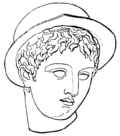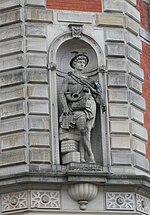Hermes
Hermes ( ancient Greek Ἑρμῆς , also Ἑρμείας Hermeias , Doric Ἑρμᾶς Hermas ) is in Greek mythology the patron god of traffic, travelers, merchants and shepherds, on the other hand also the god of thieves, art dealers, rhetoric , gymnastics and thus also the palaestra and magic. As a messenger of the gods, he proclaims the decisions of Zeus and leads the souls of the deceased into Hades (underworld). He is one of the twelve great Olympian gods .
Etymology and other names
Usually the name is derived from the Greek word ἕρμα herma ("rock", "stone", "ballast"), which is said to refer to the stone pillars on the edge of Greek roads that were erected to mark holy places. But an origin from the language of the pre-Greek population of Arcadia , where the origin of his cult is assumed, is not excluded.
The Roman equivalent of Hermes is the god Mercurius , whose name refers to trade ( Latin merces "goods"). Hermes (similar to some other Greek gods) was also identified with the god Thoth in Egyptian mythology . As Hermes Trismegistos ( Ἑρμῆς Τρισμέγιστος ) Thoth / Hermes was considered a legendary author of numerous philosophical, astrological, magical and alchemistic writings, the Neoplatonists even traced the writings of Pythagoras and Plato back to this author. The god Anubis , who in Egyptian mythology led the souls of the dead into the afterlife, was also identified with Hermes.
One of the epithets of the god is Argeiphontes ( Ἀργεϊφόντης , "Argostöter"), which characterizes him as the conqueror of the giant Argos from the Io saga. The epithets Psychagogos ( ψυχαγωγός ), Psychopompos ( ψυχοπομπός ) and Necropompos ( νεκροπομπός ) - "soul" or "death guide" - refer to his function as messenger of death, and Atlantiadēςs ( Ἀτλvaterντιάδης ( Ἀτλvaterντιάδης ) refers to his grandfather Atlas . Kyllenios ( Κυλλήνιος ) and Arkas ( Ἀρκάς ) are reminiscent of his birthplace Kyllene in northeastern Arcadia .
Hermes was considered to be the "bearer of dreams" ( ἡγήτωρ ὀνείρων hēgētōr oneirōn ) and a lucky charm ( πλουτοδότης ploutodotēs , literally "bringer of wealth"); it had jurisdiction to trade rewrite the epithets "of the market in question" ( ἐμπολαῖος empolaios ), "importer" ( παλιγκάπηλος palinkapēlos ), "the profit-determining" ( κερδέμπορος kerdemporos ) or "the market Related" ( ἀγοραῖος Agoraios ). He was also referred to as a "dog kennel " ( κυνάγχης kynanchēs , actually "dog strangler").
Say about Hermes
Birth and childhood
Hermes is the son of Zeus and the Pleiade Maia , a daughter of Atlas . Most sources consider the place of birth to be Mount Kyllēnē in Arcadia, but the area around Mount Olympus is also mentioned. Even as a toddler, Hermes is described as devious and cunning:
“On the day he was born, he left his mother's cave and killed a turtle, which he used as a sound box and thus invented the lyre . On the same day he went to Pierien . On the way there, he stole 50 cattle from Apollo and covered his tracks by weaving a kind of snowshoes out of branches. He slaughtered two of the cattle and cut them up according to the sacrificial rite. Back at the Kyllene, he slipped back into his cradle. However, a winemaker had informed Apollon about the cattle thief. When he got to Maia the next day, Hermes acted stupid and argued that he was far too young to even know what a cow was. But Apollo brought Hermes before Zeus. Hermes defends himself with all kinds of lies and stole his brother's bow and quiver at the trial. Zeus decided that Hermes must return the cattle to Apollo. Then Hermes took out the turtle veil, sang a song to play on it and offered it to Apollo in exchange for the fifty cattle. The brother accepted and Hermes was again in possession of the cattle. Now he invented the syrinx . In order to receive this, too, Apollon gave his brother his golden shepherd's staff, which from then on was to mark Hermes as a herald's staff as messenger of the gods. But he wanted to be initiated into the art of prophecy in exchange for the syrinx, which Apollo granted him insofar as he instructed him in prophecy from lots. "
According to another version, Hermes received the herald's staff from Zeus, who made him his messenger.
Further inventions of Hermes
From the Thrien , Hermes is said to have learned the art of prophecy from throwing pebbles into an urn. The game of dice and the prophecy from it are considered to be his own invention. Together with the Moiren, the development of the Greek alphabet was ascribed to him, as well as the invention of astronomy , the scale , the sports of boxing and gymnastics , weights and measures, and the culture of the olive tree .
Beloved and offspring
Numerous nymphs like Karmentis, Sose, Tanagra were among his lovers, as well as the Arcadian Krokos or Amphion , the king of Thebes . As a mother of Hermes' son Pan were Dryope , Penelope , Persephone or the goat Amalthea called, others held Zeus or Kronos for his father. Together with Aphrodite , he was assigned the parentage of the hybrid Hermaphroditos .
As mortal sons of Hermes were Daphnis , the inventor of the shepherd's seal , which had emerged from the compound with a nymph with the mortal Antianeira conceived Argonauten Eurytos and Echion , Herold the Argonauten and participants in the Trojan War , further Hercules' favorite abderus and famous thief Autolykos , whom Chione bore him.
meaning
Hermes is one of the gods whose cult can be traced back the farthest. According to mythology, he is the messenger of the gods, who brings the message of the gods to mortals and also translates it. His messages are therefore not mere communications, but demand insight and understanding. That is why the science of “explaining and understanding” is also called hermeneutics . As a messenger of the gods, Hermes can move faster than light. This is made possible by small wings, two of which are on each of his boots. Before Hermes was born, Iris was a messenger of the gods.
Like other ancient gods ( Mithras , Horus / Anubis ), Hermes was also a shepherd god . So he had both worldly and metaphysical tasks: As Zeus' messenger he was the ultimate lawgiver and highest worldly authority, as a psychopompos ("soul guide") he protected the souls of the deceased on their way to the judgment of the dead .
Shepherd deities were often portrayed as animal carriers , in the case of Hermes as kriophoros (ram carriers).
The shape of the shepherd god or animal carrier has two meanings:
- From a secular point of view, it is supposed to symbolize the caring ruler who is led by a certain god or several gods
- From a metaphysical point of view, the carrying of an animal from the herd symbolizes the function of the soul guide after death, the carried animal symbolizes the soul of the deceased living being. In Greek mythology, Hermes and Charon 'carry' the souls of the deceased over the Styx , in Egyptian mythology Anubis and Thoth 'carry' the souls of the deceased over the Eridanos . Anubis also has an important role in the ancient Egyptian judgment of the dead .
presentation
Among the Greeks Hermes was the most youthful and beardless, with a wide-brimmed hat ( Petasos ), later a winged helmet , winged shoes or winged shoulders and the charming mighty golden Caduceus (Greek kerykeion , Latin caduceus ), respectively. With this Hermes can euthanize and bring about dreams; the staff is one of its attributes. Next to the staff, around which two serpents look at each other, he usually holds a purse in Roman depictions.
He is also sometimes depicted with a turtle or a ram. If the picture shows a bearded Hermes, the beard is pointed and curved forward. You can also see Hermes with a sickle , with a pipe and sword or as a shepherd with beef . The hat is also shown half black, half white, and sometimes it wears the shell of the turtle as a helmet on its head.
Roman mythology
In Ovid's Metamorphoses , Philemon and Baucis take in Mercurius, who has risen to earth unrecognized .
Hermes in Greco-Roman philosophy
In ancient philosophy , Hermes was identified with the Logos and interpreted as the human reason sent by the gods.
Effect after antiquity
As the god of science, Hermes is closely linked to chemistry and especially alchemy . To close a vessel in such a way that nothing can in and out, the alchemists called it "with the seal of Hermes" [cum sigillo hermetis], which is where today's word hermetic comes from.
Due to its close connection to alchemy, Hermes is brought closer to the art of magic in many sources and also seen as the god of magicians, jugglers and thieves, just as a kind of "mischievous do-it-all" ( trickster ). Since his messages and arts are only of real benefit to those who really understand them, many people who get involved with Hermes end up being very ignorant.
See also
swell
- Homeric Hymns : No. 4: Hymnos to Hermes ( Greek , English ); No. 18 ( Greek , English )
literature
- Arlene Allan: Hermes ( Gods and heroes of the ancient world ). Routledge, London / New York 2018, ISBN 978-1-138-80570-5 .
- Gerhard J. Baudy, Anne Ley: Hermes. In: The New Pauly (DNP). Volume 5, Metzler, Stuttgart 1998, ISBN 3-476-01475-4 , Sp. 426-432.
- Bernhard Huss : Hermes. In: Maria Moog-Grünewald (Ed.): Mythenrezeption. The ancient mythology in literature, music and art from the beginnings to the present (= Der Neue Pauly . Supplements. Volume 5). Metzler, Stuttgart / Weimar 2008, ISBN 978-3-476-02032-1 , pp. 344-351.
- Karl Kerényi : Hermes the soul guide. The myth of the male origin of life. Lectures given at the Eranos conference in Ascona on August 4 and 5, 1942. Rhein-Verlag, Zurich 1944.
- Gesine Manuwald : The singing of little Hermes and Silenus. On the Homeric Hermes Hymn and Virgil's Sixth Eclogue. In: Rheinisches Museum für Philologie . Volume 145, 2002, pp. 150-175 ( PDF , 119 kB).
- Christian Scherer : Hermes . In: Wilhelm Heinrich Roscher (Hrsg.): Detailed lexicon of Greek and Roman mythology . Volume 1, 2, Leipzig 1890, Sp. 2342-2432 ( digitized version ).
Web links
- Hermes in the Theoi Project
- Christian Pinter: The god who invented the market. In: Wiener Zeitung.at June 9, 2000.
Individual evidence
- ↑ Adolf Schirmer : Arkas 2 . In: Wilhelm Heinrich Roscher (Hrsg.): Detailed lexicon of Greek and Roman mythology . Volume 1,1, Leipzig 1886, column 552 ( digitized version ).
- ↑ Compare the Libraries of Apollo 3,10,2; in the Homeric Hymn to Hermes ( Homeric Hymns 4,535-540) Apollo had still strictly refused to reveal the art of prophecy to his brother or any other immortal.
- ↑ Reinhard Herbig : Pan, the Greek goat god - attempt at a monograph. Klostermann, Frankfurt am Main 1949, ISBN 978-3-465-00175-1 , p. 23.
- ↑ Pierre Saintyves: Saint Christophe, successeur d'Anubis, d'Hermès et d'Héraclès. É. Nourry, Paris 1936.
- ↑ Barbara Aland, Dietmar Wyrwa: The worldliness of faith in the old church: Festschrift for Ulrich Wickert. de Gruyter, Berlin 1997, ISBN 3-11-015441-2 , p. 367.






